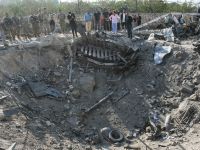Egyptians voted Wednesday in the third and final stage of a month of polling, marked by two deaths, with President Mubarak's ruling party having already secured more than half the seats.
There was heavy security around some polling stations, with armored trucks deployed in downtown Cairo, and AFP correspondents reported that police had stopped people voting in two Cairo districts where Islamist candidates were standing.
Observers said they expected a worried government to "tighten the noose" on the Muslim Brotherhood Wednesday to stop them strengthening their foothold in a parliament that the government nevertheless looks sure to dominate.
Some 160 seats to the 454-member People's Assembly were being contested, with voting in eight governorates including the capital. Final results were due November 15, a day after the third-stage runoff vote.
Two people were killed Tuesday during a family election row in a village near the southern town of Assiut after an independent candidate was invited to the home of ruling National Democratic Party (NDP) supporters, police said.
Rizq Abu Deif Salim and Shabaan Abed Rabbo died and four others were injured in a fight that broke out among family members, the police said, bringing to eight the number of election-related deaths.
Scores of people died in the previous elections in 1995.
On Wednesday, an AFP correspondent reported that security forces had closed the gates of one of the stations in Cairo's Dokki district where Muslim Brotherhood spokesman Mamun al-Hodeibi was running for parliament.
One of Hodeibi's supporters told AFP that two campaign aides, lawyer Essam Amin and teacher Ahmed Ibrahim, had been detained by police and that women with knives were turning voters away from a women's polling center in the Aguza district.
Some 282 seats have already been decided in a voting tour of the rest of the country over the past three weeks, 233 of them going to the ruling National Democratic Party (NDP) and 16 to Islamist politicians.
But of the NDP's 233 seats, only 106 were won outright, the rest being filled by successful independent candidates who later joined the ruling party.
Former election monitor and rights activist Saad Eddin Ibrahim said the ruling party would not have such a strong hold on those independent-turned-NDP deputies.
Members of the outlawed Muslim Brotherhood, which cannot field candidates on its own ticket, are marking their return to parliament after a 10-year absence.
The Brotherhood said it now had 14 seats, while other Islamists had two other seats. It said earlier it had 15 of the 16 Islamist seats.
The organization had 37 deputies in the parliament that expired in 1990, the year it boycotted the election. It participated in the 1995 vote, but none of its members was elected amid allegations of fraud.
Around a dozen other seats have been taken by the three main legal opposition parties: the liberal Wafd party, the Arab Socialist Nasserite movement, and the Marxist Tagamu party, while a score of independent winners has not declared any affiliation.
Analysts attributed the opposition gains to the presence of members of the judiciary monitoring the voting, which they say has encouraged voters to cast their ballots and ensured greater regularity.
Voting has been divided into three stages, on a geographical basis, for the first time to ensure compliance with a law passed in July that requires a member of the judiciary to be present in each of the country's 15,000 or more polling places.
A total of 444 seats are decided by elections, while the president fills the remaining 10 by appointment – CAIRO (AFP)
© 2000 Al Bawaba (www.albawaba.com)







